虚拟语气的用法
虚拟语气的用法
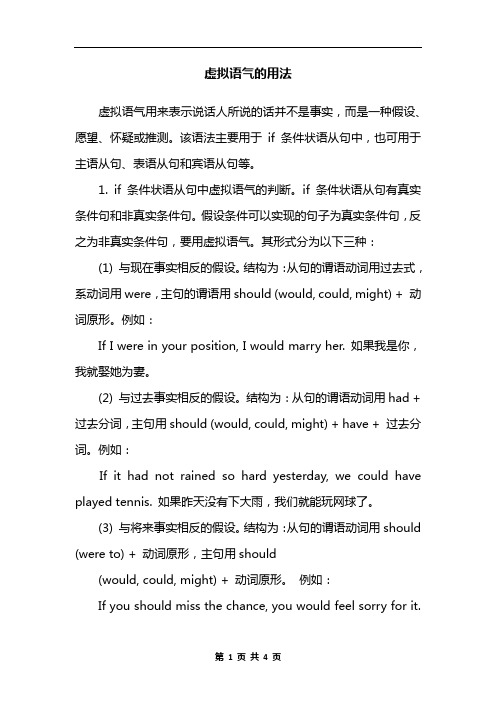
虚拟语气的用法虚拟语气用来表示说话人所说的话并不是事实,而是一种假设、愿望、怀疑或推测。
该语法主要用于if 条件状语从句中,也可用于主语从句、表语从句和宾语从句等。
1. if 条件状语从句中虚拟语气的判断。
if 条件状语从句有真实条件句和非真实条件句。
假设条件可以实现的句子为真实条件句,反之为非真实条件句,要用虚拟语气。
其形式分为以下三种:(1) 与现在事实相反的假设。
结构为:从句的谓语动词用过去式,系动词用were,主句的谓语用should (would, could, might) + 动词原形。
例如:If I were in your position, I would marry her. 如果我是你,我就娶她为妻。
(2) 与过去事实相反的假设。
结构为:从句的谓语动词用had + 过去分词,主句用should (would, could, might) + have + 过去分词。
例如:If it had not rained so hard yesterday, we could have played tennis. 如果昨天没有下大雨,我们就能玩网球了。
(3) 与将来事实相反的假设。
结构为:从句的谓语动词用should (were to) + 动词原形,主句用should(would, could, might) + 动词原形。
例如:If you should miss the chance, you would feel sorry for it.如果你错过了这次机会,你会难过的。
2. 宾语从句中的虚拟语气。
(1) wish后接宾语从句中的虚拟语气:根据从句的意义来判断。
A: 表示与现在和将来事实相反的愿望,从句谓语动词用过去时态。
例如:I wish they were not so late. 要是他们来得不是这么晚就好了。
B: 表示与过去事实相反的愿望,从句谓语动词用过去完成时态。
虚拟语气用法归纳

虚拟语气用法归纳虚拟语气是一种特殊的语法形式,用来表示说话人所表达的事实并非真实的情况。
虚拟语气通常用于陈述某种假设、愿望、建议或推测。
在英语中,虚拟语气可以用于多种句型和场景中。
以下是关于虚拟语气的一些常见用法归纳:1. 条件句虚拟语气经常用于表示条件句中的不可能或未实现的情况。
在条件句中,主句和从句之间通常以if连接,其中的动词使用虚拟语气形式,即用过去式或过去完成式表示未来或现在的假设情况。
例如:"If I were you, I would go to bed early."(如果我是你,我会早点上床。
)2. 虚拟愿望虚拟语气还可以用于表达愿望或对现实情况的怀疑。
在这种情况下,常用的句型是"if only"或"would rather"等。
例如:"Ifonly I had more money, I would travel the world."(要是我有更多的钱,我就会周游世界。
)"I would rather you went with me."(我宁愿你和我一起去。
)3. 动词要求有些动词,如命令、建议、要求等,常常要求其后的从句使用虚拟语气。
这些动词包括:recommend(推荐)、insist(坚持)、demand(要求)、require(要求)、suggest(建议)等。
例如:"She insisted that he be on time for the meeting."(她坚持要求他准时参加会议。
)4. 形容词和名词后接从句有时,形容词或名词后接从句时,从句中的谓语动词要使用虚拟语气。
这种情况通常表示说话人对从句所表达的内容的怀疑或不同意。
例如:"It is important that he study hard for the exam."(他认真备考这个考试很重要。
(完整版)英语虚拟语气语法归纳总结
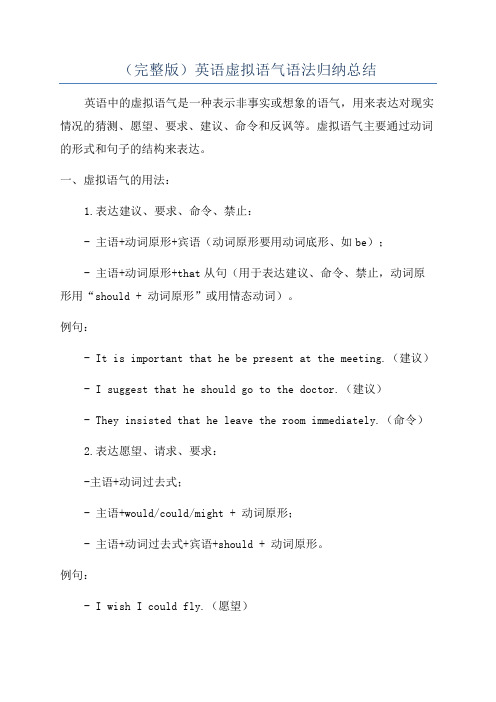
(完整版)英语虚拟语气语法归纳总结英语中的虚拟语气是一种表示非事实或想象的语气,用来表达对现实情况的猜测、愿望、要求、建议、命令和反讽等。
虚拟语气主要通过动词的形式和句子的结构来表达。
一、虚拟语气的用法:1.表达建议、要求、命令、禁止:- 主语+动词原形+宾语(动词原形要用动词底形、如be);- 主语+动词原形+that从句(用于表达建议、命令、禁止,动词原形用“should + 动词原形”或用情态动词)。
例句:- It is important that he be present at the meeting.(建议)- I suggest that he should go to the doctor.(建议)- They insisted that he leave the room immediately.(命令)2.表达愿望、请求、要求:-主语+动词过去式;- 主语+would/could/might + 动词原形;- 主语+动词过去式+宾语+should + 动词原形。
例句:- I wish I could fly.(愿望)- I would appreciate it if you could help me.(请求)3.表示虚拟条件:- If条件从句中的谓语动词用过去完成时,主句用would/should/might/could + have + 过去分词;- If条件从句中的谓语动词用过去时,主句用would/should/could + 动词原形。
例句:- If I had known his phone number, I would have called him.(虚拟条件)- If you had listened to me, we could have finished the project earlier.(虚拟条件)4.表达建议、要求、祝愿:- If only内部称述 + 主语 + 过去式。
虚拟语气的用法归纳

虚拟语气是一种特殊的动词形式,用来表达说话人的假设、愿望、猜测、建议等非现实的情况。
虚拟语气在英语中的使用非常广泛,包括情态动词、动词的过去式、过去完成时、be 型虚拟式等形式。
下面我将详细介绍虚拟语气的用法。
一、情态动词的虚拟语气1. 表示现在或将来的假设例如:If I had money, I would travel around the world.2. 表示过去的假设例如:If I had studied harder, I would have passed the exam.3. 表示与现在事实相反的愿望例如:I wish I were rich.4. 表示与过去事实相反的愿望例如:I wish I had studied harder.5. 表示与将来事实可能相反的愿望例如:I wish it would stop raining.二、动词的过去式的虚拟语气1. 表示现在或将来的假设例如:If I knew the answer, I would tell you.2. 表示过去的假设例如:If I had seen the movie, I would have recommended it to you.三、过去完成时的虚拟语气1. 表示过去的假设例如:If I had had more time, I would have finished the work.2. 表示与过去事实相反的愿望例如:I wish I had gone to the party last night.四、be型虚拟式1. 表示现在或将来的假设例如:If I were you, I would take the job.2. 表示与现在事实相反的愿望例如:I wish I were in Hawaii now.五、混合虚拟语气1. 表示过去的假设例如:If I had known that you were coming, I would have met you at the airport.2. 表示与过去事实相反的愿望例如:I wish I had studied harder and passed the exam.六、虚拟语气的特殊用法1. 在某些形容词后面使用虚拟语气例如:It is important that you be on time.2. 在某些名词后面使用虚拟语气例如:It is necessary that he study harder.3. 在某些介词后面使用虚拟语气例如:I am glad that you came.以上是虚拟语气的用法归纳,希望对大家有所帮助。
虚拟语气的用法及例子
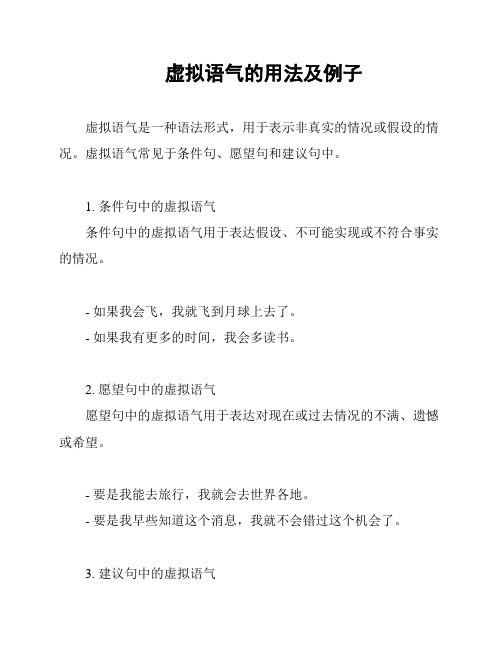
虚拟语气的用法及例子
虚拟语气是一种语法形式,用于表示非真实的情况或假设的情况。
虚拟语气常见于条件句、愿望句和建议句中。
1. 条件句中的虚拟语气
条件句中的虚拟语气用于表达假设、不可能实现或不符合事实的情况。
- 如果我会飞,我就飞到月球上去了。
- 如果我有更多的时间,我会多读书。
2. 愿望句中的虚拟语气
愿望句中的虚拟语气用于表达对现在或过去情况的不满、遗憾或希望。
- 要是我能去旅行,我就会去世界各地。
- 要是我早些知道这个消息,我就不会错过这个机会了。
3. 建议句中的虚拟语气
建议句中的虚拟语气用于表达对某种行动或情况的建议、要求或命令。
- 尽量少吃甜食,要不然你会发胖的。
- 要是你需要帮助,尽管告诉我。
虚拟语气通过使用虚拟动词和特殊的句子结构来表达。
在中文中,通常使用“如果……就……”、“要是……就……”、“如果能……就……”等句式来表示虚拟语气。
需要注意的是,虚拟语气在口语和书面语中的使用有所不同。
在口语中,虚拟语气的使用相对较少,而在正式的书面语或文学作品中,虚拟语气的使用相对较多。
希望本文对你理解和运用虚拟语气有所帮助!。
虚拟语气的用法总结
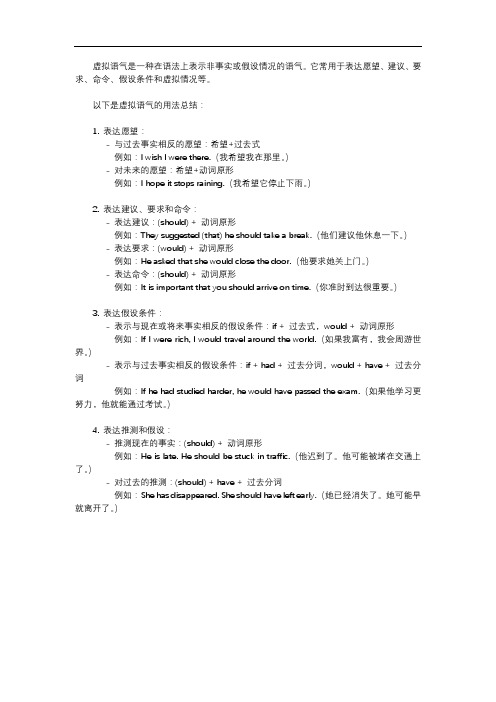
虚拟语气是一种在语法上表示非事实或假设情况的语气。
它常用于表达愿望、建议、要求、命令、假设条件和虚拟情况等。
以下是虚拟语气的用法总结:1. 表达愿望:- 与过去事实相反的愿望:希望+过去式例如:I wish I were there.(我希望我在那里。
)- 对未来的愿望:希望+动词原形例如:I hope it stops raining.(我希望它停止下雨。
)2. 表达建议、要求和命令:- 表达建议:(should) + 动词原形例如:They suggested (that) he should take a break.(他们建议他休息一下。
)- 表达要求:(would) + 动词原形例如:He asked that she would close the door.(他要求她关上门。
)- 表达命令:(should) + 动词原形例如:It is important that you should arrive on time.(你准时到达很重要。
)3. 表达假设条件:- 表示与现在或将来事实相反的假设条件:if + 过去式,would + 动词原形例如:If I were rich, I would travel around the world.(如果我富有,我会周游世界。
)- 表示与过去事实相反的假设条件:if + had + 过去分词,would + have + 过去分词例如:If he had studied harder, he would have passed the exam.(如果他学习更努力,他就能通过考试。
)4. 表达推测和假设:- 推测现在的事实:(should) + 动词原形例如:He is late. He should be stuck in traffic.(他迟到了。
他可能被堵在交通上了。
)- 对过去的推测:(should) + have + 过去分词例如:She has disappeared. She should have left early.(她已经消失了。
虚拟语气的用法总结
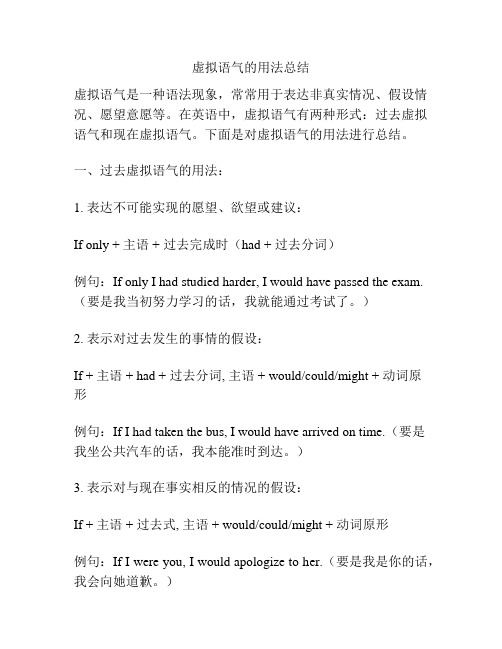
虚拟语气的用法总结虚拟语气是一种语法现象,常常用于表达非真实情况、假设情况、愿望意愿等。
在英语中,虚拟语气有两种形式:过去虚拟语气和现在虚拟语气。
下面是对虚拟语气的用法进行总结。
一、过去虚拟语气的用法:1. 表达不可能实现的愿望、欲望或建议:If only + 主语 + 过去完成时(had + 过去分词)例句:If only I had studied harder, I would have passed the exam.(要是我当初努力学习的话,我就能通过考试了。
)2. 表示对过去发生的事情的假设:If + 主语 + had + 过去分词, 主语 + would/could/might + 动词原形例句:If I had taken the bus, I would have arrived on time.(要是我坐公共汽车的话,我本能准时到达。
)3. 表示对与现在事实相反的情况的假设:If + 主语 + 过去式, 主语 + would/could/might + 动词原形例句:If I were you, I would apologize to her.(要是我是你的话,我会向她道歉。
)4. 表达对不可能实现的条件:If only + 过去式例句:If only I had a million dollars.(要是我有一百万美元该多好。
)二、现在虚拟语气的用法:1. 表达建议、命令等正式用法:表达建议:(should +动词原形/动词原形)例句:It's important (that) you should take some rest.(你应该休息一下,这很重要。
)表达命令:(应用“命令式”的虚拟形式)例句:It's vital (that) he be here on time.(他必须准时到达,这很重要。
)2. 表达愿望、要求、建议等陈述式的用法:It's time/It's high time + 过去式例句:It's time you went to bed.(你该去睡觉了,时间到了。
虚拟语气的三种用法
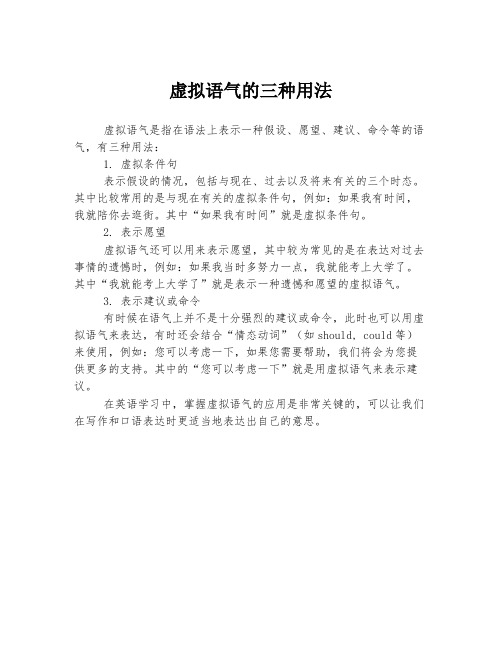
虚拟语气的三种用法
虚拟语气是指在语法上表示一种假设、愿望、建议、命令等的语气,有三种用法:
1. 虚拟条件句
表示假设的情况,包括与现在、过去以及将来有关的三个时态。
其中比较常用的是与现在有关的虚拟条件句,例如:如果我有时间,我就陪你去逛街。
其中“如果我有时间”就是虚拟条件句。
2. 表示愿望
虚拟语气还可以用来表示愿望,其中较为常见的是在表达对过去事情的遗憾时,例如:如果我当时多努力一点,我就能考上大学了。
其中“我就能考上大学了”就是表示一种遗憾和愿望的虚拟语气。
3. 表示建议或命令
有时候在语气上并不是十分强烈的建议或命令,此时也可以用虚拟语气来表达,有时还会结合“情态动词”(如should, could等)来使用,例如:您可以考虑一下,如果您需要帮助,我们将会为您提供更多的支持。
其中的“您可以考虑一下”就是用虚拟语气来表示建议。
在英语学习中,掌握虚拟语气的应用是非常关键的,可以让我们在写作和口语表达时更适当地表达出自己的意思。
- 1、下载文档前请自行甄别文档内容的完整性,平台不提供额外的编辑、内容补充、找答案等附加服务。
- 2、"仅部分预览"的文档,不可在线预览部分如存在完整性等问题,可反馈申请退款(可完整预览的文档不适用该条件!)。
- 3、如文档侵犯您的权益,请联系客服反馈,我们会尽快为您处理(人工客服工作时间:9:00-18:30)。
虚拟语气的用法一.虚拟语气在简单句中的用法: 谓语动词用原形或may +动词原形1.表示祝愿a. Long live our country. b. May you succeed. c. May you be happy all your life.2.表示命令a. Everybody leave the room.二.虚拟语气在非真实条件句中的用法: (使用虚拟语气的含条件句的复合句称为“真实条件句”)1.表示与现在事实相反的情况时, if从句的谓语用动词的过去式(be动词的过去式多用were, 而不用was), 主句的谓语用should / would / could / might +动词原形(should多用于第一人称, would多用于二三人称, could / might可用于所有人称)a. If I had more time, I should study computer better.b. If he were not so busy, she would attend the meeting this afternoon.c. If they didn’t take exercises every day, they wouldn’t be so healthy.d. If you went to bed earlier, you would not be so sleepy in the morning.e. If she invited me, I should go to the party.2.表示与过去事实相反的情况时, if从句的谓语用had done 形式, 主句的谓语用should / would / could / might + have done 的形式 a. If she had invited me yesterday, I should have gone to the party.b. I would have checked my paper again if I had had more time at yesterday’s exam.c. If you had taken the teacher’s advice, you would not have failed in the exam.3.表示与将来事实相反的情况时, if从句的谓语形式是: ①.完全动词过去式(be的过去式通常用were); ②.should +动词原形;③.were to do. 其中②, ③种情况都含有“出乎意料之外”之意; 主句的谓语的形式是: should / would / could / might +动词原形 a. If she should invite me tomorrow, I should go to the party.b. If it rained / should rain / were to rain tomorrow, our picnic would be put off.c. If I saw him tomorrow, I would pass your note to him.d. I might come back if I were to miss the train.三.虚拟语气在非真实条件句中用法的几个变体:1.条件从句省略if: 在书面语中, 如果条件从句中的谓语中有were, had, should等词, 可将if省略, 而把were, had, should 放在句首 a. Were I you (=If I were you ), I would get up early very early.b. Had you arrived (=If you had arrived ) at the station ten minutes earlier yesterday, you could have caught the train.2.省略条件从句或主句, 省略部分的含义仍有所体现. 省略主句时, 表示己不能实现的愿望a. You could have done it yourself (if you had wanted to).b.I wouldn’t smoke (if I were you).c. If my old friends were with me! (要是老朋友和我在一起该多好啊)d. If you could have seen the wonderful film!3.主从句时间不一致时, 主从句谓语动词的形式取决于要表示的具体时间a. You would speak English well if you had practised speaking it every day.b. If she hadn’t trained so hard, she wouldn’t be able to run so fast.4.假设的条件不以条件从句, 而以其他方式如介词短语、从句等表达出来, 这种句子称为含蓄条件句a. What would you do with a million dollars?b. Without/But for music, the world would be a dull place.c. We could have done better with more money.d. He would have given you more help, but he has been so busy.e. He must have been very busy, or he could not have won the game.f. I’m really very busy, otherwise, I would certainly take you to visit the zoo.四.虚拟语气在as if / though从句中的用法:1.表示与现在事实相反或对相在情况有所怀疑, as if / though从句谓语用过去式a. He speaks English so well as if she had studied English in England.b. She looked as if she were ill.2.表示与过去事实相反的情况, as if / though从句谓语用过去完成式a. The machines operated as if it had been repaired.**as if 从句也可表示真实情况,谓语动词用陈述语气 a. It looks as if it is going to rain.五.虚拟语气在含even if / though从句的复合句中的用法:在此类复合句中, 若表示与事实相反, 可用虚拟语气形式. 主从句的谓语动词形式与非真实条件句相同a. Even if I were rich, I would work.六.虚拟语气在主语从句中的用法:如果表示说话人的看法, 想法或意见, 在句型“It is / was + adj. + that从句”中, 主语从句中可用虚拟语气. 主语从句中谓语动词用should do表示现在或将来情况, 用should have done表示过去情况a. It is necessary that you should clean the lab before you left.b. It is important that you should take the doctor’s advice.c. It was very strange that he should have left without say goodbye.七.虚拟语气在宾语从句中的用法:1.在wish的宾语从句中, 通常表示不可能实现或没有实现的愿望, 常用虚拟语气①.wish的宾语从句用过去式, 表示现在或将来没有实现或不可能实现的愿望a. I wish I knew the result of the match now.b. I wish it were spring here all the year round.c. I wish I could help you.d. I wish I were young.②.wish的宾语从句用过去完成式, 表示过去没有实现或不可能实现的愿望a. We wish we had got the film tickets last night.b. I wish youI had met him yesterday.③.wish的宾语从句若用would, 则一般表示请求, 对现状不满或希望未来有所改变a. I wish the prices would come down.b. I wish you would help me.c. I wish he would be more careful.d. We wish you would spend the holiday with us.2.在动词suggest (建议), advise (建议), propose, demand (要求), require (要求), order (命令), insist (坚持)后的宾语从句中, 谓语动词常用“( should )+动词原形”的虚拟语气形式a. I suggested that we should go there at once.b. I demand that he should answer me at once.c. The doctor insisted that the patient should stay in bed for two weeks.d. The officer ordered that the soldiers should stop playing.与名词suggestion建议/ advice 建议/ demand要求/request要求/ order命令有关的从句(包括同位语从句、表语从句、主语从句等)中的谓语也用“( should ) +动词原形”a. The black people made a strong demand that the government ( should ) take steps to change the unfair situation.b. Their demand is that the government should take steps to change the unfair situation.c. I was Bill’s suggestion that everybody should have a map.d. His suggestion was that everybody should have a map.e. What do you think of their proposal that we should all speak English at the meeting?f. It is requested that she should sing a song at the birthday party.**注意,含上述动词的简单句不用虚拟语气a. The officer ordered his men to start before daybreak.b. The salesman suggested us /our trying another shop.**注意,suggest解释“表明、暗示”、insist解释“坚持说、硬要说”,则不用虚拟。
